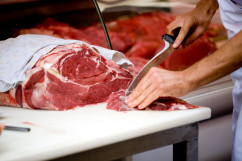Meat Trade Journal News
The government plans to set up a new Food Crime Unit by the end of the year, as recommended by the post-horsegate Elliott review final report, which was published today.
Professor Chris Elliott’s review, carried out in response to last year’s horsemeat scandal, has made a number of recommendations to tackle food fraud, which have all have been accepted by environment secretary Elizabeth Truss.

As well as setting up the Food Crime Unit, the government has said it will be “ensuring we have a resilient network of food analytical laboratories to test food consistently”, and “improving coordination across government to protect food integrity and tackle food crime”.
The final report said that a new Food Crime Unit, based on the Dutch model, should be created with the FSA which would become the lead agency for food crime. It continued that a strong central team and dedicated staff with specialist skills would be needed with a range of functions.
The government said the unit will be set up “to give greater focus to enforcement against food fraud in government by analysing intelligence, initiating investigations and liaising with other criminal and regulatory enforcement agencies”.
In response to the report, Truss said: “We’re taking action to make sure that families can have absolute confidence in the food that they buy. When a shopper picks something up from a supermarket shelf it should be exactly what it says on the label, and we’ll crack down on food fraudsters trying to con British consumers.”
The British Meat Processors Association (BMPA) director Stephen Rossides said: “The BMPA welcomes publication of the final report of the Elliott Review. We will need to study the report’s findings and recommendations carefully before responding in more detail.”
With competitions, speakers and latest innovations on display, butchers are being urged to register for free entry to this Autumn’s Butchers and Bakers Fair.
Taking place at the Newark Showground, Nottinghamshire, and featuring the irrepressible television legend Keith Chegwin as guest presenter, the fair will offer a mix of entertainment, challenge and networking for butchers across the UK.

Entries to the National Pie Competition are still open, and butchers will be facing off against bakers in a bid to claim the prizes during the fair, which takes place at the Newark Showground, Nottinghamshire, on 12 October.
The pie contest features four categories, including Pork Pie, Savoury Pie, Steak and Kidney Pie and Pasties, giving opportunities to compete across a broad spectrum. Previous years have seen the butchery sector dominate against their rival bakers, but this year could see that change.
Other attractions include the UK’s number one sausage competition, Champion of Champions, which sees the best sausages from across the country judged to discover the ultimate sausage maker. Ed Bedington editor of Meat Trades Journal, which organises the events, said: “Champion of Champions is a long running prestigious competition which for many butchers is the ultimate accolade. Being declared the UK’s best sausage maker is a prize worth winning, and even if you are not in the competition, the wider fair activities gives you the chance to mix and mingle with some of the country’s top sausage producers.”
Alongside the competitions. a wide range of exhibitors and companies will be offering their latest products, innovations and technologies to help butchers and bakers in their trade. There will also be a range of presentations and speakers, designed to inspire butchers and help them develop their businesses further.
The new butchery apprenticeship standard, developed by a Trailblazer Employer Group, has received ministerial approval after “months of hard work”.
The Butchery Trailblazer Employer Group, made up of representatives from companies including Morrisons, Aubrey Allen, Fairfax Meadow, Bernard Matthews and Tulip, saw its new standard formally published on 20 August after the ministerial approval.
The standard will replace current frameworks as part of the government’s employer-driven Trailblazer Strategy.

Skills minister Nick Boles said: “Since 2010 there have been over 1.8 million apprenticeship starts and the Butchery Trailblazer is leading by example in the development and delivery of high-quality apprenticeships that give people the chance of successful careers and help businesses get the skills they need to grow.
”Lucianne Allen, chair of the Trailblazer group and sales and marketing director of Aubrey Allen, said: “This new standard will be responsive to the needs of our industry, meaning that each apprentice we train will have the skills, knowledge and behaviours we require. Our business is very much looking forward to the new standard coming into effect in 2015.”
The Food and Drink Training and Education Council (FTC), which supported the group, also offered its congratulations. Chief executive Bill Jermey said: “We are delighted to receive this announcement today, it is testimony to the hard work which the employer-led group has put into this reform.
“Today is a real milestone for the sector, one which will have a strong and positive impact on the future of the industry in terms of the way in which we can develop the skills and knowledge of young butchers. At FTC we welcome the new approach to apprenticeships that the government is taking. And we could not be more happy with the quality of this new butchery standard. Very well done to all involved.”
It is a commonly discussed subject; the average age of a UK butcher seems to be between 50 and 60. I wonder what the average age would have been in 1950 after the war?
However, there now seems to be a healthy number of younger butchers emerging in and around London. We currently have three staff – all former chefs – who have become qualified butchers due to the better hours and better living conditions. They have an added advantage over us when it comes to product development and flavour balancing. There has also been an increase in new butcher’s shops started up by keen, inspired young men, along with father-to-son(s) succession. It is certainly easier to continue an established business. One former employee of ours started a new business about four years ago, with a small budget and a lot of heart. Now he has taken over a second shop and has a very happy local customer base. But the next thing is to attract school-leavers, and show them the benefits of the meat trade.

We recently advertised for an apprentice butcher, offering a full apprenticeship. There was a very quick response from a 17-year-old, who was not currently working. His name is Jamie. He had taken a job as an apprentice electrician, but in the six months employed, he had just worked as a cashier in the electrical shop. He had never been assessed, trained or tested and felt there was no prospect of development, so he left.
During the interview, I outlined the sort of apprenticeship I had in mind, and the job role he would be doing. As I led him around the shop and preparation areas it was a new experience for him. He left, and the other members of staff met me with smiles and questions. We had been short-staffed for a few weeks, and everybody was glad to hear he was starting on Monday.
Well Jamie has been with us for four weeks, and we’re really pleased with how he is progressing. He is starting a Level 3 butchery apprentice course very shortly. He can already dice and trim some cuts. He is the youngest member of the team for a long time.
UK meat leaders have expressed disappointment over the reporting of a US-based study which claimed that beef production was 10 times more damaging to the environment than other livestock.
The study, published in the Proceedings of the National Academy of Sciences (PNAS), claimed that by applying a uniform methodology to data from the US Departments of Agriculture, the Interior and Energy, it showed that beef was far ahead of other proteins when it came to environmental impact.
A summary of the study said: “The authors found that impacts of dairy, poultry, pork, and eggs were mutually comparable within a factor of two. Beef, however, required 28 times more land, 11 times more irrigation water, five times more greenhouse gas emissions, and six times more reactive nitrogen fertiliser than the respective average burdens of the other four livestock categories.

”Plant-based production, however, including potato, wheat and rice, on average needed “two to six times fewer resources per calorie consumed than non-beef livestock”, it added.
The news has been widely reported across mainstream media, but UK meat bosses have hit back at the coverage, which they said failed to recognise that US production differed considerably from UK grass-fed production.
Nick Allen, sector director for red meat levy body Eblex, said: “Our rain-fed pasture system means we have one of the most efficient and sustainable livestock production systems in the world. In the UK, cattle and sheep primarily convert grass, which cannot be used to feed people, into nutritious food for our growing population. We have very little reliance on irrigation; in fact it takes just 67 litres of water to produce 1kg of beef.
“There are also additional environmental benefits of grazing ruminants, not least in terms of landscape management and maintaining biodiversity, yet livestock production still comes in for undue criticism.
”One of the authors of the report Professor Gidon Eshel, speaking to The Guardian newspaper, acknowledged that US grain-fed production systems exacerbated the issues surrounding feed inefficiency, but he said that even grass-fed cattle had greater environmental footprints than other animal products.
He said the aim of the study was to change the consumer mind-set: “While my work in recent years has clearly demonstrated that plant-based diets exact lower environmental costs than animal-based ones, in the new paper we recognise that this and related work by others have changed little in US diets; people still eat animal-based products with an ever-increasing gusto.
“Our study has a number of implications. First, it can help environmentally minded individuals make environmentally better dietary choices. Perhaps more importantly, the paper can also help inform US agricultural policy.”